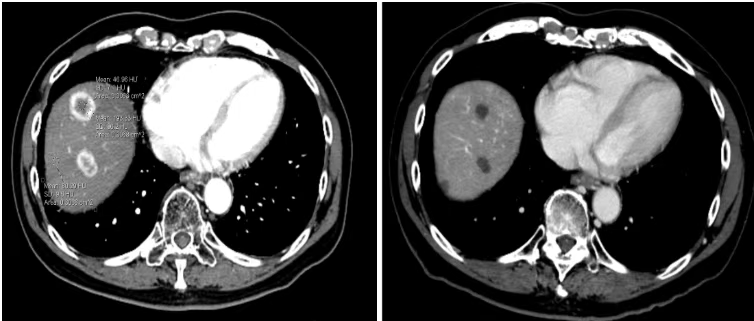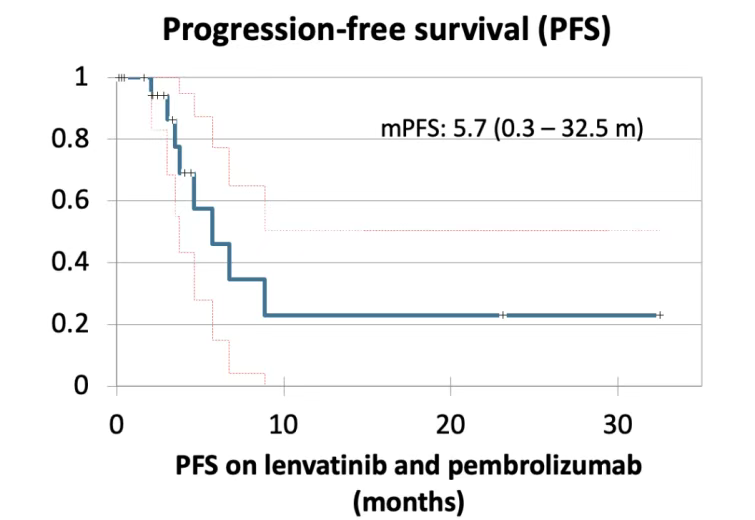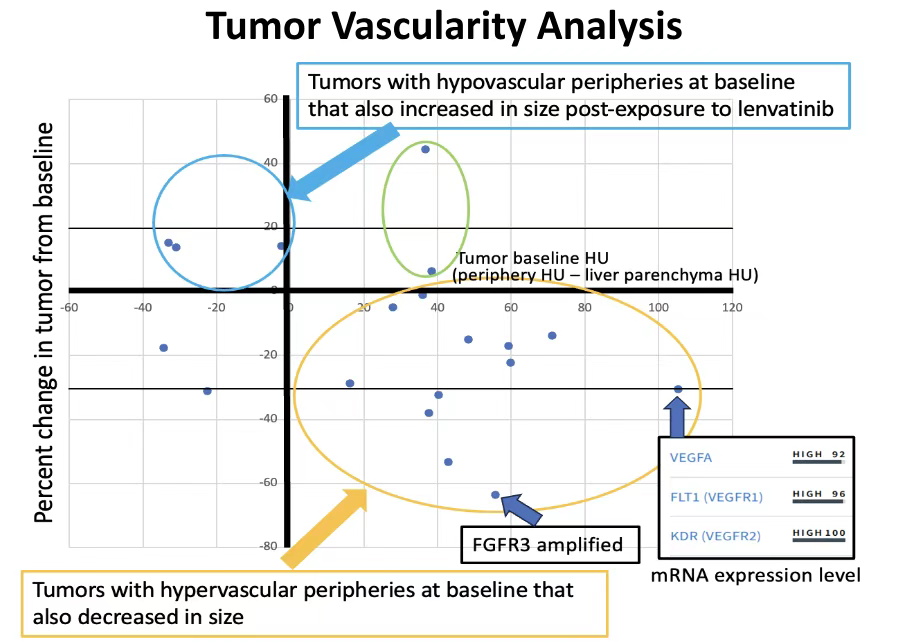- 首页 > 正文
NCCN 2025|仑伐替尼联合帕博利珠单抗治疗晚期胆道癌的突破性发现
发表时间:2025-06-08 20:31:24
编者按
美国国立综合癌症网络(NCCN)2025年会于3月28~30日在美国奥兰多隆重召开。会议期间,Baylor College of Medicine医学院的一项研究入选壁报展示,该研究分析了仑伐替尼联合帕博利珠单抗用于晚期胆道癌患者后线治疗的可行性。《肿瘤瞭望消化时讯》现将内容整理如下,以飨读者。
研究背景
胆管癌是一种起源于胆管上皮细胞的高度侵袭性恶性肿瘤,多数患者在确诊时已进展至晚期。
目前,晚期胆道癌患者的标准一线治疗方案为吉西他滨+顺铂联合度伐利尤单抗或帕博利珠单抗("可乐组合")。2021年ABC-06研究确立了FOLFOX方案(奥沙利铂+亚叶酸钙+5-FU)作为晚期胆管癌患者的标准二线治疗方案,但其疗效有限,患者中位无进展生存期(mPFS)仅为4.0个月,客观缓解率(ORR)低至5%,患者预后较差。
仑伐替尼作为一种多靶点酪氨酸激酶抑制剂(TKI),通过抑制VEGFR、FGFR及PDGFR等靶点发挥抗血管生成作用,目前已在肝癌、肾癌等多种富血供肿瘤中证实疗效。2021年,LEAP-005研究显示仑伐替尼联合帕博利珠单抗对经治的胆管癌患者展现出良好的应用前景(mPFS=6.1个月)。然而,这项2B类推荐方案近期被NCCN指南删除,使得本就治疗选择有限的晚期胆管癌患者失去了一项重要治疗选择。
基于现有证据,我们推测"可乐组合"可能对特定晚期胆道肿瘤亚群具有特殊价值,尤其是表现为富血供特征或携带VEGF/FGFR通路易感突变的患者。
研究方法
研究人员对2020年9月至2024年8月期间接受仑伐替尼联合帕博利珠单抗("可乐组合")作为后线治疗方案的晚期胆道癌患者进行了回顾性分析。
研究系统收集了患者的人口统计学特征、基因突变谱、治疗持续时间及可行情况下的转录组学分析数据。通过动脉期增强CT评估治疗前后肿瘤血管生成情况,采用亨氏单位(HU)定量分析肿瘤边缘与肝实质及肿瘤内部的密度差异(密度越高提示血管生成越丰富),并计算血管富集度(HU梯度=肿瘤血管HU值-肝实质HU值)。客观缓解率(ORR)评估遵循RECIST v1.1标准。
研究结果
研究共纳入20例晚期胆道肿瘤患者,其中17例为肝内胆管癌(占85%),15例为女性患者(占75%),中位年龄61岁。疗效分析显示,患者的mPFS为5.7个月(范围:0.3~32.5个月),ORR达30%(6/20)。此外,13例患者达到疾病稳定(SD)。值得注意的是,在14例富血供肿瘤患者中,仅2例(14.3%)出现治疗后肿瘤增大。分子特征分析发现,携带IDH1或ARID1A基因突变的患者对治疗反应良好,而存在TP53突变的患者疗效相对较差。




研究结论
在这项针对晚期胆道癌患者的小样本研究中,仑伐替尼联合帕博利珠单抗对表现为富血供特征或携带ARID1A/IDH1基因突变的肿瘤显示出显著疗效。这些发现提示,该联合治疗方案可能成为特定亚型胆管癌(如富血供型或特定分子特征型)患者的有效治疗选择。然而,现有研究样本量有限,亟需开展更大规模的前瞻性对照研究进一步验证其临床价值。
摘要原文
Lenvatinib +- Pembrolizumab in Advanced Biliary Tract Cancer – Targeting HypervascularityBackground:Cholangiocarcinoma is an aggressive cancer arising from the biliary ducts that is often diagnosed at an advanced stage.For metastatic disease, 1L standard therapy is gemcitabine and cisplatin + durva/pembro.The ABC-06 trial in 2021 established FOLFOX as the standard 2L option.However, prognosis is poor with a mPFS of only 4.0 months and ORR of 5%.Lenvatinib is a TKI with anti-angiogenic properties via inhibition of VEGFR, FGFR, PDGFR -used in many hypervascular cancers (i.e., HCC and RCC)used in many hypervascular cancers (i.e., HCC and RCC).LEAP-005 in 2021 showed Lenvatinib with Pembro as a promising option against pre-treated cholangiocarcinoma (mPFS 6.1 months).However, this Category 2B regimen was recently removed by NCCN.This removed a good oncologic option for this cancer with limited systemic options.We hypothesize that Lenvatinib with Pembro has a role in treating a subset of advanced BTCs – those expressing hypervascular characteristics or harboring predisposing mutations (VEGF/FGFR).Methods:A retrospective analysis was conducted on patients with advanced BTC (Sept 2020-Aug2024) receiving Lenvatinib +- Pembrolizumab after progression on earlier lines of therapy.Demographics, mutational status, treatment duration, and transcriptomic analysis (whenpossible) were collected.Tumor vascularity, both pre- and post- treatment, was evaluated on arterial contrast CT.We used Hounsfield units (HU) to compare the tumor periphery to the liver parenchyma and tumor itself –higher densities -> higher vascularity.Degree of hypervascularity (HU gradient) was calculated as tumor vasculature HU minus liver parenchyma HU.ORR was determined using RECIST v1.1.Results:N = 20 (17 intrahepatic, 15 female), median age 61.mPFS of 5.7 months (0.3-32.5); ORR of 30% (n=6) with stable disease in 13 patientsOf 14 patients with hypervascular tumors, only 2 enlarged after treatmentIDH1/ARID1A mutated tumors responded well, TP53 mutated tumors responded poorly.Conclusion:?In a small cohort of patients with advanced BTC, Lenvatinib with Pembrolizumab showed efficacy against tumors displaying hypervascularity as well as certain mutations (ARID1A/IDH1).Lenvatinib with Pembrolizumab could serve as an effective regimen in certain cholangiocarcinomas. Further controlled studied with larger cohorts are required.
- 推荐文章
